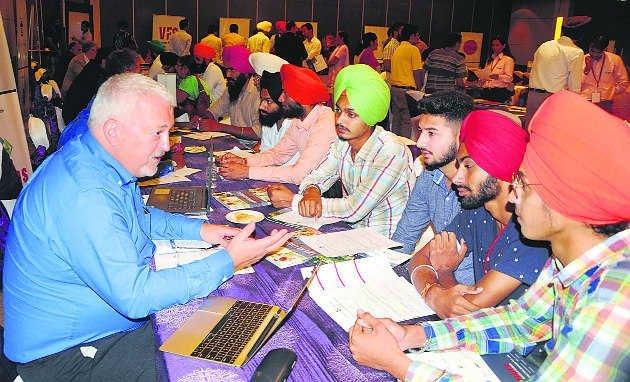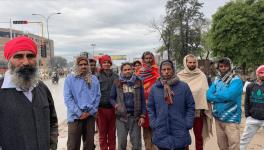Rural Punjab Pays for Student Visa Rush

Representational Image. Image Courtesy: The Tribune
It is an open secret in Punjab that rural families are risking it all to procure a study visa for their children to go overseas. Farmers are selling livestock to buy air tickets and disposing off farm machinery to secure expensive foreign education for their sons and daughters. The result is growing indebtedness as families sell their gold for cash. They are sliding socially and economically, as they pawn their land to pay for visas and student fees.
Study visas have become a favoured route for emigration among youngsters and their parents in Punjab’s cotton-growing Malwa belt, but the trend has caught up all over the state. In response to the surge in applicants for student visas from Punjab, and to curb the associated problems, countries are erecting entry barriers. The higher the price of a study visa gets, the more indebtedness in the region.
Gurvinder Jouda, who owns Neeta Jewellers in Bhuchho Mandi in district Bathinda of the Malwa region, says, “Four people walk in every day to pledge or sell their jewellery. Half of them want to fund the cost of a study visa.” Private finance companies also report more people walking in these days to avail loans against jewellery. Aman Mittal, the owner of Mittal Jewellers in Barnala town, also in the Malwa zone, says that more families are selling jewellery in rural Punjab than before. “Mothers are selling gold earrings to send sons or daughters abroad,” he says. The proprietor of a large jewellery store in Giddarbaha town in Bathinda district says he gets eight to 10 such customers every month.
Punjab’s large tractor markets are located at Talwandi Sabo, Barnala, Moga, Zira, Malot and Kotkapura towns, again in the Malwa region. Tractor merchant Mastan Singh from Moga says, “Parents are selling tractors to send children abroad.” Gurcharan Singh, another tractor merchant from Talwandi Sabo says that every week, six or seven farmers, keen to send their children abroad, sell their tractors to him. “Tractor mandis have become a hub for ornaments, not farm equipment,” he says.
The trend of sending children abroad on study visas has intensified in Malwa due to rising unemployment and the fear that their children will fall prey to the state’s drug problem—drug abuse is widespread in the eight districts that fall in Malwa. The story of one family in Firozepur’s Paune village is enough to reflect the social consequences of this new crisis wrought by the desire for study visas. After the elderly owner of this household died, his son sold their family’s land holdings to send the grandson abroad. The grandson left India, but could not attend the last rites of his own mother, who passed away soon after—the cost of flight tickets was prohibitive.
Paramjit Singh Mata, head of the Malwa Animal Trader Welfare Society, says that 60% of people sell their animals at the cattle fairs due to financial compulsions, and their desire for study visas for their children is seen as a need, not a luxury. “They mortgage their land on the faith that their son will pay for its release once he goes abroad,” Mata says.
Jagmeet Singh, a young farmer in Muktsar says that many farmers who mortgage their lands start ploughing it on behalf of its new owners. Thus, their social and economic status is completely transformed. The farmer continues to live on the same plot of land and occupies the same house, but that is only a veneer: the family has turned from land-owner to lessee.
Families are turning assets into cash, which also leaves the country with their child. Thus, homes become empty while the parents are left behind, consoling themselves with their expectation of a better future. A new trend has also come to the fore, of the young men who have been selected in higher bands of the IELTS tests seeking such young women who can fund their overseas sojourn.
These days, millions of students from Punjab make a beeline for IELTS testing centres after passing their class XII examination. Scores of testing centres now dot Punjab’s cities, attracting young people. In just 2018-19, around 1.5 lakh students went to Canada, Australia, the United States and other countries on study visas from Punjab. This has drastically reduced the number of students enrolling in colleges in the state. The number of students has decreased in Punjabi University, Patiala, Panjab University and other prominent educational centres. Ironically, the universities are responding to the crisis by encouraging the trend of students leaving the state and the country.
A senior government official informs that the state has even considered proposals to close some rural universities down; based on the fall in enrolments.
“Punjabis started going abroad in significant numbers in the early 20th century. Foreign money brought prosperity to Punjab, and that is why Punjabis feel that their lives will be happy abroad. Most Punjabis also have relatives abroad, which means it is easier to migrate,” says Rajpal Singh, a prominent historian and sociologist.
Going abroad has come to symbolise an easy and comfortable existence to Punjabis, but the instability in agricultural income and the failure of industries is also pushing the state towards an economic crisis. At such a time, Punjabis are bound to feel that they can only seek solace in the go-abroad option.
Rajpal reveals another fact: only the land-owning sections and the middle class can afford to go to Canada, America, England and Australia to study, as they are expensive countries. The downtrodden and the lower strata of Punjab society, due to their weak economic conditions, mostly goes to smaller countries such as Kuwait.
Gurpreet Singh, a Canadian journalist of Punjabi origin, says that educated young people from Punjab do not face many difficulties in establishing a foothold abroad, but those who leave the state only after finishing school find the transition difficult. Nowadays, the numbers of such young boys and girls is increasing.
Social and cultural worker Harish Modgil explains the falling age of migrants: “This trend is a consequence of our bad economic and political system. The youth are not getting jobs that fit their qualifications or abilities—many progressive organisations have been raising this issue. Sadly, instead of creating suitable employment for the youth, the state government is planning to teach IELTS [English speaking] in government schools so that the youth can go abroad.”
Rachna Singh, a Vancouver-based politician who is originally from Punjab says, “Parents take loans to ensure their children can go abroad. They think that when the children are settled, they will automatically repay the loans. But this is not so easy a task because students can work for only 20 hours a week, for which they are paid $14 per hour.” The students have to manage their own living expenses within this income. Those who work illegally beyond permitted hours earn less, get exploited and grapple with fears of being caught. After they complete their studies, they can apply for work permits; but becoming a permanent resident can take seven years or longer.
Besides, few such students gain admission in good universities: Punjabi students largely end up in institutes that are not ranked well. These institutions do empty the pockets of the students and their families back home, but they do not end up in jobs. “Such students struggle to survive. It is difficult for them to take away their parents’ loan burden,” says Rachna Singh.
Their parents are left with little but indignity and tears.
The author is an independent journalist. The views are personal.
Get the latest reports & analysis with people's perspective on Protests, movements & deep analytical videos, discussions of the current affairs in your Telegram app. Subscribe to NewsClick's Telegram channel & get Real-Time updates on stories, as they get published on our website.















